Edinburgh bin workers clear up after 12-day strike
A major clear-up is under way in Edinburgh after a first wave of strikes by council bin workers came to an end.
Unions launched industrial action on 18 August in the middle of the Edinburgh Festival, in a pay dispute with local government body Cosla.
The walkout in the capital ended at 04:59 as rubbish continues to pile up in other Scottish council areas.
On Monday Unite, the GMB and Unison confirmed further strikes would be held after rejecting an increased pay offer.
City of Edinburgh Council said additional resources would be deployed to support the clean up.
However, it said many residents would not have their full backlog of waste collected before the next round of action on 6 September.
People are being asked to store their waste "a little longer" while waste and recycling staff catch up.
The 140,000 households that have kerbside pickups in the city have landfill waste and dry recycling waste collected on alternate weeks.
The council said only one type of rubbish would be picked up per household.

City centre a 'nightmare'
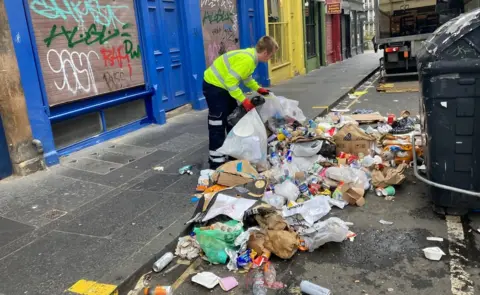
By Angie Brown, BBC Scotland Edinburgh reporter
I saw the first signs of the great clean-up of Edinburgh when I reached the West Port from the south of the city this morning.
A young refuse collector was filling a large black street bin with bags full of rubbish for the fourth time that hour.
He said it was a "nightmare" task as the bin lorry, which mechanically empties the large street bins, only had a certain capacity.
He said he was filling the bin with all the bags piled beside it before waiting until the lorry had emptied it before starting again.
The driver told me his young colleague would be "exhausted within an hour at this rate".
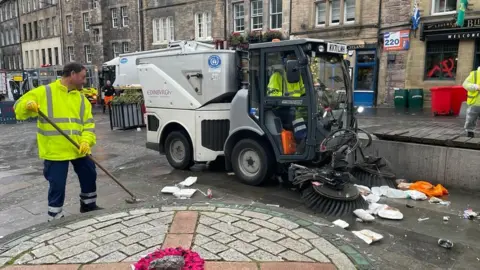
The driver also said a one-hour job was taking four hours because they normally only had to empty each bin once.
He said it was the worst he had ever seen, and that they would not have the city centre cleaned up by the end of their 12-hour shift.
Cleansing workers then cleared the loose rubbish left on the street with road sweepers and manually with brushes.
One road sweeper said they would try their best to get as much of it cleaned as possible but that it was a "mammoth task".
Cleansing staff later in the day in the West Port said it was "disgusting" work.
They also said the strike had been hard and they had all lost money but that "you have to lose a bit of money to make a bit of money".

The leader of City of Edinburgh Council, Cammy Day, told BBC Radio's Good Morning Scotland programme he expected to see residual waste collected by Sunday and the city returning to its pre-strike state next week.
However, he said there was a chance this could be disrupted if impending strikes next week were not resolved.
He said: "We have another Cosla leaders' meeting this Friday. I think there's probably only one thing hanging which is the consolidation of pay into the lowest paid.
"I think if Cosla and the government could secure that, we would have an offer at least to go back to the trade unions' membership."
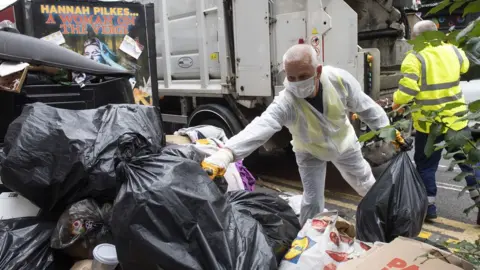 PA Media
PA MediaPublic Health Scotland has warned of a human health risk from overflowing waste and advised councils to decontaminate areas where bins have overflowed.
Edinburgh Councillor Scott Arthur said: "I think it's really important that we get things back to normal so we can be proud of our city and proud of our council staff.
"I feel ashamed at some of the sights we've seen in the city centre.
"I say that as someone who absolutely supports the staff because I think they deserve a fair pay rise."
Unions had been seeking an agreement from Cosla similar to the one made to council workers in England - which included a £1,925 flat rate pay increase.
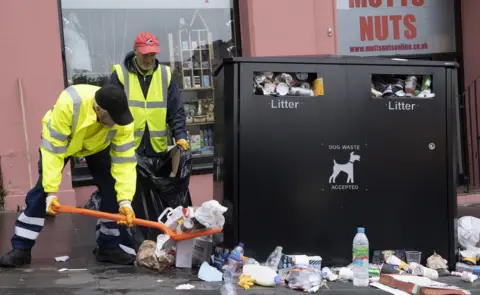 PA Media
PA MediaThe pay dispute led to action by refuse staff at two-thirds of Scotland's councils and is also set to close schools and nurseries.
Edinburgh began the first of a series of strikes around the country after the GMB, Unite and Unison rejected an initial pay offer equivalent to a 3.5% increase.
Strikes continue outside Edinburgh
The action escalated last week when refuse workers at a further 20 local authorities walked out despite the revised 5% offer.
Workers in 13 areas, including Glasgow, Aberdeen and Dundee, are still on strike until Wednesday.
A second wave of strikes is due to begin on 6 September, with hundreds of schools and nurseries also scheduled to close from 6 to 8 September. The action affecting Angus, Dundee and Perth and Kinross will take place from 7 to 9 September.
On Monday, Unite and the GMB rejected a further offer from Cosla, while Unison said it would put it to its members.
Cosla's offer of a £1,925 pay uplift matched the offer to council workers in England - but only part of this payment was consolidated into staff salaries. The rest would be given as one-off cost of living payments.
Unions said this means lower-paid staff would not benefit as much as those on higher wages.
Unite industrial officer Wendy Dunsmore told Good Morning Scotland: "We are absolutely resolute that this is going to be a winter of discontent and it will escalate.
"But we are hoping against all hope that the Scottish government and Cosla will see sense and get back round the table with a proper rise for the lowest paid within local authorities.
"The offer remains unacceptable and it represents a waste of precious time."
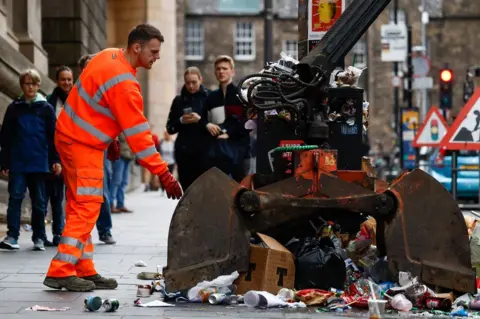 Getty Images
Getty ImagesMark Ferguson of Unison's local government committee said strike action was a "last resort".
Following talks on Tuesday afternoon between Deputy First Minister John Swinney and unions, GMB Scotland's Keir Greenaway said they "were giving Cosla every opportunity to do the right thing."
He said: "The message delivered on behalf of our members was clear: Do more for the lowest paid workers by delivering a flat rate offer for their consultation.
"The deputy first minister also reiterated his position that there is no more money to offer, but we were also clear the existing offer is not in the words of Cosla bosses, 'as good as it gets'."
The Scottish government has given an additional £140m to councils to help fund a pay increase for staff.
Deputy First Minister John Swinney also said a further £200m would be offered over two years to provide a cost-of-living payment to workers earning below £39,000.
Mr Swinney added: "No deal is perfect, and I wish we could go further, but this deal does offer significant increases for those on low pay."
Cosla said it was disappointed that unions had turned down an offer that was at the "absolute extremes" of affordability.
Resources spokesperson Katie Hagmann said: "We have done everything we possibly can to get to this stage and this offer - which is still on the table - is as good as it gets."
